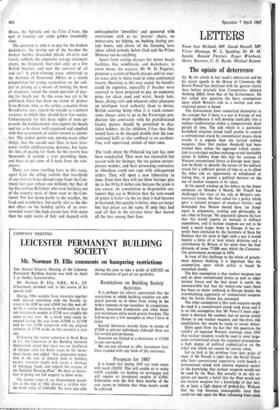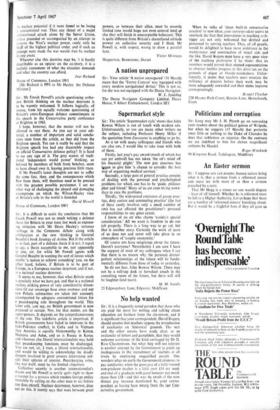The opiate of deterrence
LETTERS
From Ivor Richard, MP, David Howell, MP, Victor Montagu, W. L. Spalding, Dr M. M. Sundle, Ronald Fletcher, Roger Wimbush, Henry Burrows, C. G. Byrde, Michael Boston.
Sir: By his article in last week's srscraron and by his recent speech in the House of Commons Mr Enoch Powell has disclosed with far greater clarity than before precisely how Conservative defence thinking differs from that of the Government. He has called into question the basic assumptions upon which Britain's role as a nuclear and con- ventional power is based.
The Government have committed themselves to the concept that if there is a war in Europe of any major significance it will develop inevitably into a nuclear confrontation within a comparatively short period of time. The side which in a particular battlefield situation found itself unable to control a conventional attack by conventional means alone would, it is argued, then use tactical nuclear weapons. Once that nuclear threshold had been crossed then, unless the aggressor halted, escala- tion to a strategic nuclear exchange would inevitably ensue. It follows from this that the purpose of Western conventional forces in Europe must there- fore be firstly to identify the nature of the military attack for a sufficient period of time so as to allow the other side an opportunity of withdrawal or failing that, to permit a political decision on the use of nuclear weapons to be taken.
In his speech winding up the debate on the Army estimates on Monday 6 March, Mr Powell has challenged this view of the role of Britain's con- ventional forces. He then called for a policy which gave 'a rational prospect of eventual victory,' and demanded that Britain should have 'an Army equal in armaments, training and philosophy to any other in Europe.' He apparently ignores the fact that this would require an increase in military expenditure, and if nuclear weapons are not to be used, a much larger Army in Europe. It has re- cently been estimated by the Secretary of State for Defence that for NATO to fight such a war it would require a force of at least ninety divisions and a contribution by Britain of far more than the four divisions of some 77,000 men which the Conserva- tive government promised in 1954.
In view of this challenge to the whole of govern- ment defence thinking, it is important that the assumptions upon which policy is based be examined closely.
The first assumption is that nuclear weapons can and do deter conventional forces as well as other nuclear forces and the best proof is surely the unanswerable fact that for twenty-one years there has been no major outbreak in Europe despite the overwhelming superiority of -.:onventional weapons that the Soviet Union has possessed The other assumption is that such weapons would be used if a conventional attack took place and it is on this assumption that Mr Powell's main argu- ment is directed. He assumes that no nation would choose to use nuclear weapons and therefore risk annihilation, but would be ready to accept defeat.
Quite apart from the fact that this questions the validity of repeated Western warnings since 1945 that nuclear weapons would be used to deter large- scale conventional attack the argument presupposes a high degree of political sophistication on the other side which we cannot be certain exists.
Let us look at the problem from their point of view: if Mr Powell is right then the Soviet Union who have conventional superiority could launch a conventional attack with relative impunity secure in the knowledge that nuclear weapons would not be used by the West. But actually to do this re- quires not merely a belief that the West would not use nuclear weapons but a knowledge of that fact, or, at least, a high degree of probability. Without that the risk becomes unacceptable since they could not rely upon the West refraining from using
its nuclear potential if it were found to be losing a conventional war. Thus any threat of a major conventional attack alone by the Soviet Union, unless preceded or accompanied by an attempt to remove the West's nuclear power, couli only be bluff of the highest political order, and if such an attempt were made the war would then be nuclear in any event.
Whatever else this doctrine may be, ;t is hardly describable as an opiate: on the contrary, it is a realistic assessment of what the situation demands and what the country can afford.
Ivor Richard House of Commons, London SW1
[Mr Richard is PPS to Mr Healey, the Defence Minister.]































 Previous page
Previous page